- Home
- Jr. Horatio Alger
Risen from the Ranks; Or, Harry Walton's Success
Risen from the Ranks; Or, Harry Walton's Success Read online
Produced by Al Haines
RISEN FROM THE RANKS,
OR,
HARRY WALTON'S SUCCESS.
BY
HORATIO ALGER, JR.,
AUTHOR OF "RAGGED DICK," "TATTERED TOM," "LUCK AND PLUCK,""BRAVE AND BOLD" SERIES.
1874.
To
THOMAS E. BARRY,
of the
BOSTON BAR,
THIS VOLUME
INSCRIBED WITH FRIENDLY REGARD
PREFACE.
"Risen from the Ranks" contains the furtherhistory of Harry Walton, who was firstintroduced to the public in the pages of "Bound toRise." Those who are interested in learninghow far he made good the promise of hisboyhood, may here find their curiosity gratified.For the benefit of those who may only read thepresent volume, a synopsis of Harry's previouslife is given in the first chapter.
In describing Harry's rise from the ranks Ihave studiously avoided the extraordinaryincidents and pieces of good luck, which the storywriter has always at command, being desirousof presenting my hero's career as one which maybe imitated by the thousands of boys similarlyplaced, who, like him, are anxious to rise fromthe ranks. It is my hope that this story,suggested in part by the career of an eminentAmerican editor, may afford encouragement tosuch boys, and teach them that "where there isa will there is always a way."
New York, October 1874.
RISEN FROM THE RANKS;
OR,
HARRY WALTON'S SUCCESS.
CHAPTER I.
HARRY WALTON.
"I am sorry to part with you, Harry," said Professor Henderson. "Youhave been a very satisfactory and efficient assistant, and I shallmiss you."
"Thank you, sir," said Harry. "I have tried to be faithful to yourinterests."
"You have been so," said the Professor emphatically. "I have hadperfect confidence in you, and this has relieved me of a great dealof anxiety. It would have been very easy for one in your position tocheat me out of a considerable sum of money."
"It was no credit to me to resist such a temptation as that," saidHarry.
"I am glad to hear you say so, but it shows your inexperiencenevertheless. Money is the great tempter nowadays. Consider howmany defalcations and breaches of trust we read of daily inconfidential positions, and we are forced to conclude that honesty isa rarer virtue than we like to think it. I have every reason tobelieve that my assistant last winter purloined, at the least, ahundred dollars, but I was unable to prove it, and submitted to theloss. It may be the same next winter. Can't I induce you to changeyour resolution, and remain in my employ? I will advance your pay."
"Thank you, Professor Henderson," said Harry gratefully. "Iappreciate your offer, even if I do not accept it. But I have madeup mind to learn the printing business."
"You are to enter the office of the 'Centreville Gazette,' I believe."
"Yes, sir."
"How much pay will you get?"
"I shall receive my board the first month, and for the next sixmonths have agreed to take two dollars a week and board."
"That won't pay your expenses."
"It must," said Harry, firmly.
"You have laid up some money while with me, haven't you!"
"Yes, sir; I have fifty dollars in my pocket-book, besides havinggiven eighty dollars at home."
"That is doing well, but you won't be able to lay up anything for thenext year."
"Perhaps not in money, but I shall be gaining the knowledge of a goodtrade."
"And you like that better than remaining with me, and learning mybusiness?"
"Yes, sir."
"Well, perhaps you are right. I don't fancy being a magician myself;but I am too old to change. I like moving round, and I make a goodliving for my family. Besides I contribute to the innocent amusementof the public, and earn my money fairly."
"I agree with you, sir," said Harry. "I think yours is a usefulemployment, but it would not suit everybody. Ever since I read thelife of Benjamin Franklin, I have wanted to learn to be a printer."
"It is an excellent business, no doubt, and if you have made up yourmind I will not dissuade you. When you have a paper of your own, youcan give your old friend, Professor Henderson, an occasional puff."
"I shall be glad to do that," said Harry, smiling, "but I shall haveto wait some time first."
"How old are you now?"
"Sixteen."
"Then you may qualify yourself for an editor in five or six years. Iadvise you to try it at any rate. The editor in America is a man ofinfluence."
"I do look forward to it," said Harry, seriously. "I should not besatisfied to remain a journeyman all my life, nor even the half ofit."
"I sympathize with your ambition, Harry," said the Professor,earnestly, "and I wish you the best success. Let me hear from youoccasionally."
"I should be very glad to write you, sir."
"I see the stage is at the door, and I must bid you good-by. Whenyou have a vacation, if you get a chance to come our way, Mrs.Henderson and myself will be glad to receive a visit from you.Good-by!" And with a hearty shake of the hand, Professor Hendersonbade farewell to his late assistant.
Those who have read "Bound to Rise," and are thus familiar with HarryWalton's early history, will need no explanation of the precedingconversation. But for the benefit of new readers, I willrecapitulate briefly the leading events in the history of the boy ofsixteen who is to be our hero.
Harry Walton was the oldest son of a poor New Hampshire farmer, whofound great difficulty is wresting from his few sterile acres aliving for his family. Nearly a year before, he had lost his onlycow by a prevalent disease, and being without money, was compelled tobuy another of Squire Green, a rich but mean neighbor, on a sixmonths' note, on very unfavorable terms. As it required greateconomy to make both ends meet, there seemed no possible chance ofhis being able to meet the note at maturity. Beside, Mr. Walton wasto forfeit ten dollars if he did not have the principal and interestready for Squire Green. The hard-hearted creditor was mean enoughto take advantage of his poor neighbor's necessities, and there wasnot the slightest chance of his receding from his unreasonabledemand. Under these circumstances Harry, the oldest boy, asked hisfather's permission to go out into the world and earn his own living.He hoped not only to do this, but to save something toward paying hisfather's note. His ambition had been kindled by reading the life ofBenjamin Franklin, which had been awarded to him as a school prize.He did not expect to emulate Franklin, but he thought that byimitating him he might attain an honorable position in the community.
Harry's request was not at first favorably received. To send a boyout into the world to earn his own living is a hazardous experiment,and fathers are less sanguine than their sons. Their experiencesuggests difficulties and obstacles of which the inexperienced youthknows and possesses nothing. But in the present case Mr. Waltonreflected that the little farming town in which he lived offeredsmall inducements for a boy to remain there, unless he was content tobe a farmer, and this required capital. His farm was too small forhimself, and of course he could not give Harry a part when be came ofage. On the whole, therefore, Harry's plan of becoming a mechanicseemed not so bad a one after all. So permission was accorded, andour hero, with his little bundle of clothes, left the paternal roof,and went out in quest of employment.
After some adventures Harry obtained employment in a shoe-shop aspegger. A few weeks sufficed to make him a good workman, and he wasthen able to earn three dollars a week and board. Out of this sum behoped to save enough to pay the note held by Squire Green against hisfather, but there were two unforeseen obstacles. He had th
emisfortune to lose his pocket-book, which was picked up by anunprincipled young man, by name Luke Harrison, also a shoemaker, whowas always in pecuniary difficulties, though he earned much higherwages than Harry. Luke was unable to resist the temptation, andappropriated the money to his own use. This Harry ascertained aftera while, but thus far had succeeded in obtaining the restitution ofbut a small portion of his hard-earned savings. The second obstaclewas a sudden depression in the shoe trade which threw him out ofwork. More than most occupations the shoe business is liable tothese sudden fluctuations and suspensions, and the most industriousand ambitious workman is often compelled to spend in his enforcedweeks of idleness all that he had been able to save when employed,and thus at the end of the year finds himself, through no fault ofhis own, no better off than at the beginning. Finding himself out ofwork, our hero visited other shoe establishments in the hope ofemployment. But his search was in vain. Chance in this emergencymade him acquainted with Professor Henderson, a well-known magicianand conjurer, whose custom it was to travel, through the fall andwinter, from town to town, giving public exhibitions of his skill.He was in want of an assistant, to sell tickets and help himgenerally, and he offered the position to our hero, at a salary offive dollars a week. It is needless to say that the position wasgladly accepted. It was not the business that Harry preferred, buthe reasoned justly that it was honorable, and was far better thanremaining idle. He found Professor Henderson as he called himself, aconsiderate and agreeable employer, and as may be inferred from theconversation with which this chapter begins, his services were verysatisfactory. At the close of the six months, he had thesatisfaction of paying the note which his father had given, and so ofdisappointing the selfish schemes of the grasping creditor.
This was not all. He met with an adventure while travelling for theProfessor, in which a highwayman who undertook to rob him, came offsecond best, and he was thus enabled to add fifty dollars to hissavings. His financial condition at the opening of the present storyhas already been set forth.
Though I have necessarily omitted many interesting details, to befound in "Bound to Rise," I have given the reader all the informationrequired to enable him to understand the narrative of Harry'ssubsequent fortunes.

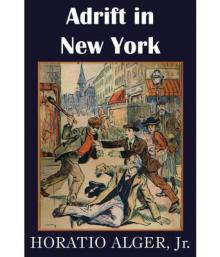 Adrift in New York: Tom and Florence Braving the World
Adrift in New York: Tom and Florence Braving the World Do and Dare — a Brave Boy's Fight for Fortune
Do and Dare — a Brave Boy's Fight for Fortune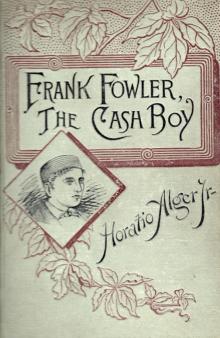 The Cash Boy
The Cash Boy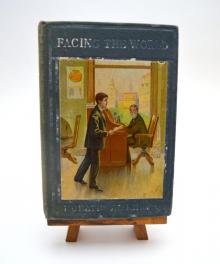 Facing the World
Facing the World The Young Explorer; Or, Claiming His Fortune
The Young Explorer; Or, Claiming His Fortune The Store Boy
The Store Boy Frank's Campaign; Or, The Farm and the Camp
Frank's Campaign; Or, The Farm and the Camp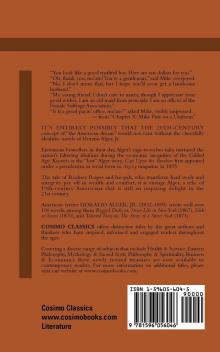 Cast Upon the Breakers
Cast Upon the Breakers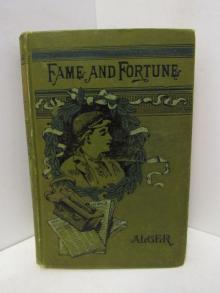 Fame and Fortune; or, The Progress of Richard Hunter
Fame and Fortune; or, The Progress of Richard Hunter The Errand Boy; Or, How Phil Brent Won Success
The Errand Boy; Or, How Phil Brent Won Success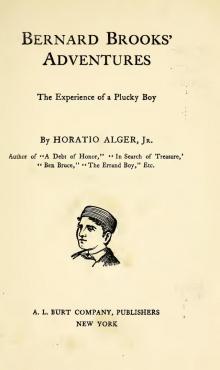 Bernard Brooks' Adventures: The Experience of a Plucky Boy
Bernard Brooks' Adventures: The Experience of a Plucky Boy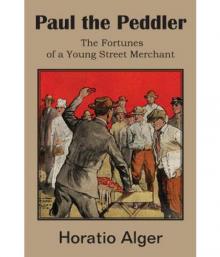 Paul the Peddler; Or, The Fortunes of a Young Street Merchant
Paul the Peddler; Or, The Fortunes of a Young Street Merchant Brave and Bold; Or, The Fortunes of Robert Rushton
Brave and Bold; Or, The Fortunes of Robert Rushton Try and Trust; Or, Abner Holden's Bound Boy
Try and Trust; Or, Abner Holden's Bound Boy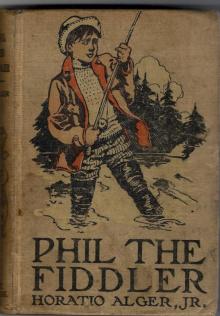 Phil, the Fiddler
Phil, the Fiddler In A New World; or, Among The Gold Fields Of Australia
In A New World; or, Among The Gold Fields Of Australia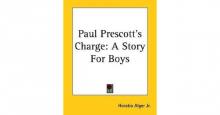 Paul Prescott's Charge
Paul Prescott's Charge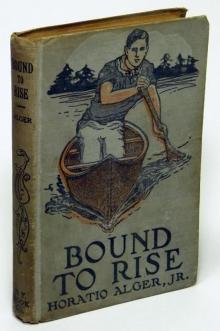 Joe's Luck; Or, Always Wide Awake
Joe's Luck; Or, Always Wide Awake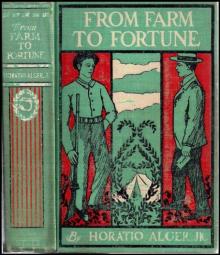 From Farm to Fortune; or, Nat Nason's Strange Experience
From Farm to Fortune; or, Nat Nason's Strange Experience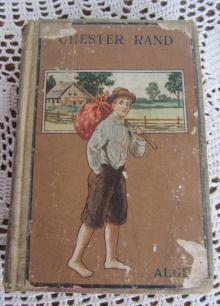 Chester Rand; or, The New Path to Fortune
Chester Rand; or, The New Path to Fortune Driven from Home; Or, Carl Crawford's Experience
Driven from Home; Or, Carl Crawford's Experience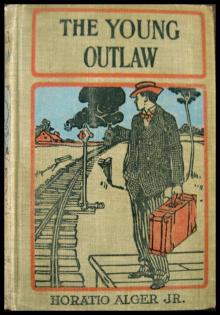 The Young Outlaw; or, Adrift in the Streets
The Young Outlaw; or, Adrift in the Streets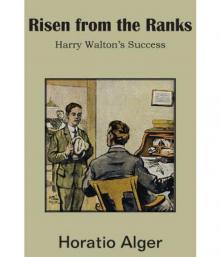 Risen from the Ranks; Or, Harry Walton's Success
Risen from the Ranks; Or, Harry Walton's Success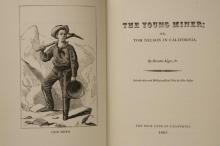 The Young Miner; Or, Tom Nelson in California
The Young Miner; Or, Tom Nelson in California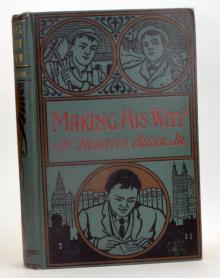 Making His Way; Or, Frank Courtney's Struggle Upward
Making His Way; Or, Frank Courtney's Struggle Upward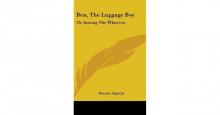 Ben, the Luggage Boy; Or, Among the Wharves
Ben, the Luggage Boy; Or, Among the Wharves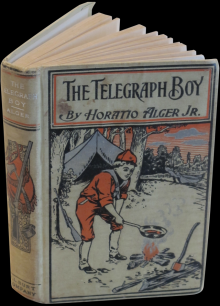 The Telegraph Boy
The Telegraph Boy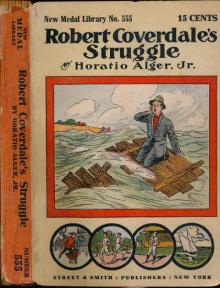 Robert Coverdale's Struggle; Or, on the Wave of Success
Robert Coverdale's Struggle; Or, on the Wave of Success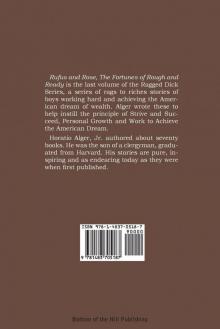 Rufus and Rose; Or, The Fortunes of Rough and Ready
Rufus and Rose; Or, The Fortunes of Rough and Ready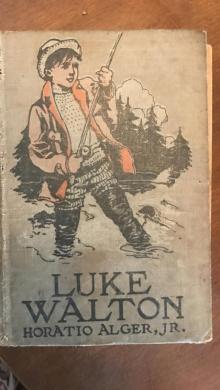 Luke Walton
Luke Walton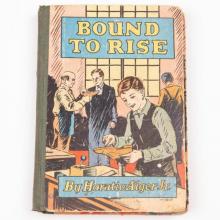 Mark Mason's Victory: The Trials and Triumphs of a Telegraph Boy
Mark Mason's Victory: The Trials and Triumphs of a Telegraph Boy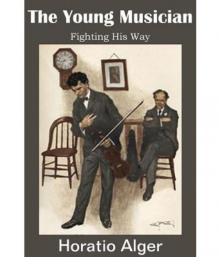 The Young Musician; Or, Fighting His Way
The Young Musician; Or, Fighting His Way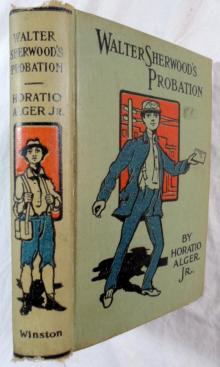 Walter Sherwood's Probation
Walter Sherwood's Probation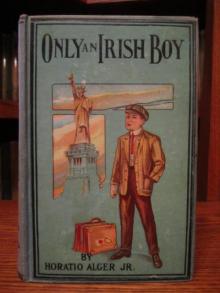 Only an Irish Boy; Or, Andy Burke's Fortunes
Only an Irish Boy; Or, Andy Burke's Fortunes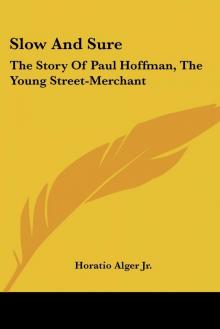 Slow and Sure: The Story of Paul Hoffman the Young Street-Merchant
Slow and Sure: The Story of Paul Hoffman the Young Street-Merchant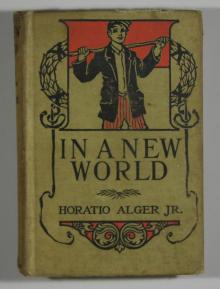 Herbert Carter's Legacy; Or, the Inventor's Son
Herbert Carter's Legacy; Or, the Inventor's Son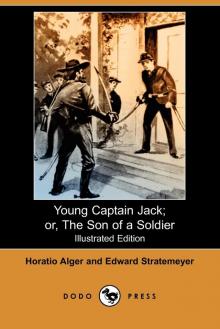 Young Captain Jack; Or, The Son of a Soldier
Young Captain Jack; Or, The Son of a Soldier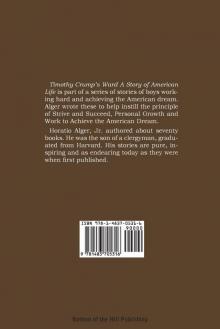 Timothy Crump's Ward: A Story of American Life
Timothy Crump's Ward: A Story of American Life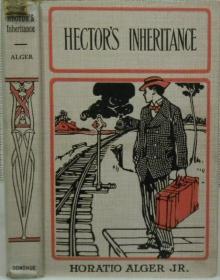 Hector's Inheritance, Or, the Boys of Smith Institute
Hector's Inheritance, Or, the Boys of Smith Institute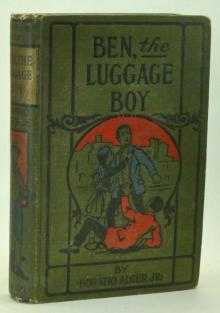 Ben's Nugget; Or, A Boy's Search For Fortune
Ben's Nugget; Or, A Boy's Search For Fortune